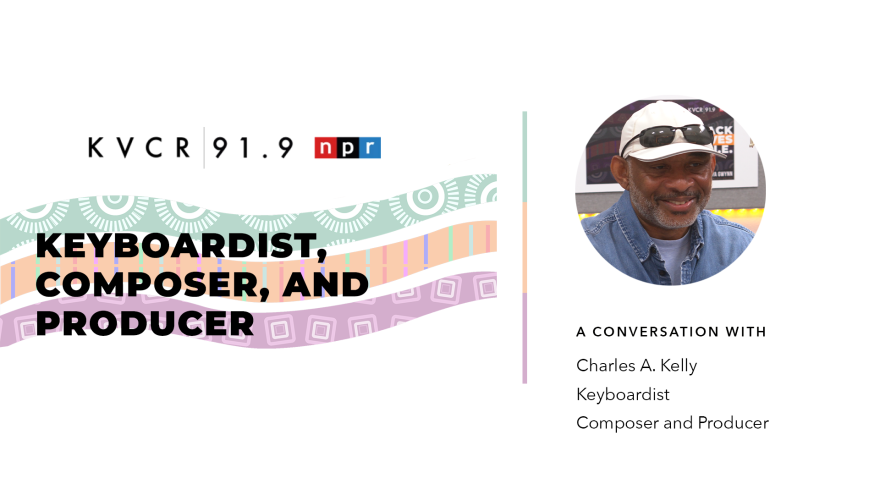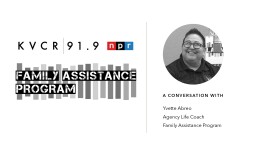Maya Gwynn
With KVCR Public Media. I'm Maya Gwynn with Black Perspectives IE, a show where we learn about the amazing things members of the Black community are doing in the Inland Empire. My guest today is Charles A. Kelly, gold record awarded keyboardist, composer and producer who has worked with icons such as Stevie Wonder, Elton John, Earth, Wind and Fire and more. Thank you so much for being here, Charles.
Charles A. Kelly
Thank you, Maya, for having me.
Maya Gwynn
I love jazz. Can you tell us about when you first fell in love with jazz? And was there a particular artist album or a moment that sparked your interest?
Charles A. Kelly
I fell in love with jazz when I was in Philadelphia. The people that I used to listen to was Herbie Hancock. Yeah, you know, when I first heard the Headhunters album, I said to myself, Wow, this is really different. And the fact that he was playing so many different instruments, meaning that back then, in the 70s, you know, you had the piano, of course, but then you had electronic instruments taking over. He would play clavinet, he would play synthesizers to mini moves, to arts. And I thought that that was really good. So at that time, I was starting to to learn electronic music. And I thought that what he was doing regarding wasn't, wasn't just one facet of jazz, but it was, it was this whole jazz fusion thing that he was doing with electronic music and regular jazz and rock. So it was Herbie Hancock and Miles Davis, probably back in 1972/73 when I was very, very young, but that's when I started really falling in loving with it.
Maya Gwynn
Nice. Jazz is deeply rooted in black history and resistance. How has that legacy influenced your own music and artists identity?
Charles A. Kelly
Oh, quite a bit. I mean, for instance, I have a song on my new album, my latest album, phase two, called Amani reynas. And I wanted to go deep with that song, because it's more about emboldening African American women. If you know the story about Amanirenas, she was a Nubian queen from the time of Kush back around 24/25 BC, and with that, there's a lot of real hardcore Thelonious Monk type jazz things that's in there. So it's influenced me quite a bit. I think that the new jazz now is really great. I have no problems with it, but I think that when you go back, you have to understand where, where people like Duke Ellington and Louis Armstrong, their contributions add to it, because that gives it the legitimacy. You know, I think, I think an artist that that's kind of relatively new, somebody like a Robert Glasper, he gets that because you can hear the Miles Davis in him. You can hear those things. I think understanding our struggle is all a part of putting it together. Because when music was first derived here, we didn't have sheet music. We didn't have, you know - music was used as a form of communication, and jazz is one of those unspoken forms of communication. I mean, how you have to communicate with people in jazz. You have to be able to, what I call see the lanes. You have to have enough musicianship so you can see, okay, this person's going here, this person's playing this mode. This person's playing this mode. The way I see it is that there's so many highways, and when a person goes here, oh, you go here, somebody goes left, you go you go left, or you can compliment. So it's one of these things where it goes back to the old days where we communicated with each other without a script, without any kind of thing, and jazz is the way that we do it, without words.
Maya Gwynn
Yeah, I love that you talked about like some of the OGs, like Duke Ellington was my grandmother's favorite jazz musician. Is there an artist, a modern artist, maybe in hip hop or pop, that isn't necessarily doing jazz, but you can definitely see jazz elements in their work.
Charles A. Kelly
Well, yeah, I mean, there's Kendrick Lamar. Kendrick Lamar is a guy I think that is probably, in my opinion, the best artist out there right now. Because if you listen to his shows, not only is it the hip hop side of it, he has heavy, heavy jazz influence. And when you start breaking down his beats, they're not typical 4/4 beats. A lot of those beats are derived over in Africa, and you can kind of hear it. And he's beyond what other people are doing today.
Maya Gwynn
Jazz is known for improvisation. What does improvisation mean to you, both musically and spiritually?
Charles A. Kelly
Okay, I think that the big thing is being a conduit. And what I mean by conduit is that you have to know your skill well enough so that the Holy Spirit can flow through you. Yeah, and that's a whole nother level, you know? I think what happens with a lot of musicians is that they they get bogged down with chords, or they get bogged down with the notes, then you can't allow the Spirit to flow through you. So you can really create magic once a person really understands their skill set and they really can get there. That's when creativity can happen and God can flow. I've heard Prince talk about that. I've heard Miles. I mean, I've experienced this time and time and time again. How do you connect with somebody through your art? How do you reach out to them? You know, they don't care about the notes that you're playing. They care about how you connect to them so that you can help them to change their lives.
Maya Gwynn
What's the lesson you carry today from a moment that might have seemed small at a time, but maybe a glance, a note or piece of advice from a legend that you've worked with because you've worked with many legendary people.
Charles A. Kelly
Steve. I've worked with Steve intensely for about seven or eight years at a certain point in time. We still see each other every now and then, but it was a time when, my wife knows this, I did, like, four songs in a day, right? And I was kind of bragging about it. I was young, and I'm like, Man, I did four. So I went in studio, did four songs in a day. And Steve said, "Well, that's okay, that's cool." He was very positive. He said, "But why don't you take four days to do one song?" And I didn't really understand what he was talking about at the time. I was like, huh, but when I started to really understand what he's saying is that take the time to do something well enough where it's undeniable and don't worry about the limitations of time. And that's something that I think that's really stuck in my head, because it's all based on quality. When we're all gone, it's the music that you leave behind. So when he said, Why don't you take four days to do one song, I really thought about that, and that really shifted my whole mindset and let me know that it's about the quality, not the quantity.
Maya Gwynn
Definitely, all right, so we're gonna move to our rapid fire portion. So I'm really interested in this question. If your work had a theme song as a musician, what would it be?
Charles A. Kelly
Innervisions.
Maya Gwynn
And besides music, if you had to teach a master class or give a TED talk on a random skill that you have, would it be?
Charles A. Kelly
Oh, business. Business for sure.
Maya Gwynn
And do you have a favorite Inland Empire restaurant or, like, a landmark that reminds you of the Inland Empire?
Charles A. Kelly
I don't know about a landmark, but I think Sunrise Church for me. Because Sunrise Church, the leadership was so good, and it kind of stuck with me.
Maya Gwynn
And how can people keep up with you and support your work?
Charles A. Kelly
They can go to my website, CharlesAKelly.com. They can go Google. I mean, I'm all over the internet. They can go wherever they want to pick up my music. They can go to Spotify. Wherever I'm all out there. Just google me. I'm there.
Maya Gwynn
Okay, thank you so much for being here, Charles.
Charles A. Kelly
Thank you.
Maya Gwynn
Charles A. Kelly is a gold record awarded keyboardist, composer and producer. Find this segment and others at kvcr news.org/bpie. Support for this segment comes from the Black Equity Fund at IECF, advancing racial equity and supporting long term investments in black led organizations in Riverside and San Bernardino counties. Join us again next week for Black Perspectives IE. For KVCR Public Media, I'm Maya Gwynn. Thank you.







